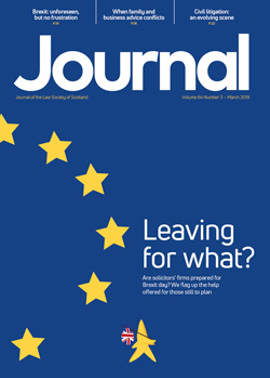Cohabitants: rebalancing the law

Certain parts of the law providing rights for cohabiting couples have been subject to recent scrutiny by the Law Society of Scotland.
Section 28
Following separation, it is possible for a cohabitant’s claim to be time-barred, and we have called for an amendment to s 28 to allow the court to accept a claim made after the one-year time limit on cause shown. We know that there are many reasons why a court action may not be raised within one year of separation. Legal commentary has shown that cohabitants may not be aware of their rights, or one or both parties may be suffering from the emotional effects of the relationship breakdown.
There is also the potential for vulnerable individuals to be placed at a disadvantage as a result of the limited time frame for lodging a claim. For example, an abused partner may be reluctant to pursue a claim shortly after the breakdown of the relationship for fear of repercussions.
Recent case law suggests that an action raised on the basis of unjustified enrichment is not competent in situations where s 28 would have applied, unless there are “special and strong circumstances” (Courtney’s Exrs v Campbell [2016] CSOH 136). The court’s judgment has arguably given rise to uncertainty and unfairness. While we recognise that unjustified enrichment is a remedy of last resort, we also consider that parties to whom the provisions of s 28 apply should be entitled to raise a claim on the basis of unjustified enrichment in appropriate circumstances.
Section 29
In the report, we have also proposed linking the time limit for a claim following the death of a cohabitant to the grant of confirmation.
Under s 29, a claim must be made to the court within six months of the date of the death of the cohabitant, and there is currently no discretion for the court to accept an application after this period has expired. This is a limited period when an individual is likely to be grieving and may be dealing with practical matters following the death of their cohabitant.
We have suggested that the permitted period should be up to 12 months from the date of death, or in a case where confirmation is obtained in respect of the deceased’s estate after the expiry of 12 months from death, up to six months from the date of confirmation. Under either circumstance, it should also be open to the court to allow the late lodging of an application on cause shown.
Our proposal to reform the time limit under s 29 echoes recommendations made by the Scottish Law Commission in its 2009 Report on Succession Law. The Scottish Government’s 2015 consultation on succession law has also shown support for such an extension, as 64% of respondents to the relevant question agreed with an extension of the period for claim to one year from the date of death. In its response to the consultation, published in October 2018, the Government also stated it would make no changes to allow a claim by a cohabitant in a testate estate. We considered this issue in our consultation and agree with the Government’s position to restrict the extension of s 29 claims to intestate cases.
Further review
The Society has called for a wider review of the provisions of ss 25-29A of the Family Law (Scotland) Act 2006 and has highlighted a number of other issues relating to the law on cohabitation, including the definition of a cohabitant.
To read the full report please visit the Law Society of Scotland’s website. To respond to the Scottish Government’s consultation on the law of succession, click here. John Kerrigan is a consultant at Morisons LLP and a member of the Society’s Trusts & Succession Law Subcommittee
SLC to review ss 25-28
The Scottish Law Commission has completed a scoping exercise on its own review of the 2006 Act, in which it proposes to focus on ss 25-28, you can view it here.
In this issue
- How will Brexit affect my mother-in-law?
- Settling the debate on sequestration
- Taking wellbeing seriously
- How will personal data continue to flow after Brexit?
- Buildmark, and a little extra help for NHBC
- Reading for pleasure
- Opinion: Laurie Anderson
- Book reviews
- Profile: Lord Mackay of Clashfern
- President's column
- People on the move
- Is your legal software ready to remain compliant in 2019?
- What's the deal?
- Ready to leave?
- A tapering opportunity
- Brexit: no dealbreaker either
- The business of divorce
- Trailblazing 12
- Cohabitants: rebalancing the law
- Litigation: an evolving scene
- Chain transactions
- When delay is not fatal
- Data protection – deal or no-deal?
- Two cases and an order
- Reshaping trade mark law
- When the wheels come off
- Parentage or privacy?
- Access right, right of access or right of way?
- Team of one
- Public policy highlights
- OPG update
- Housing specialism added to accreditation list
- At the boundary's edge
- Keep the dual role
- Executry and trust accounting: new guidance
- Moving nightmares
- Accredited paralegal update
- Sign up for conference
- Accredited Paralegal Committee profile
- Ask Ash






